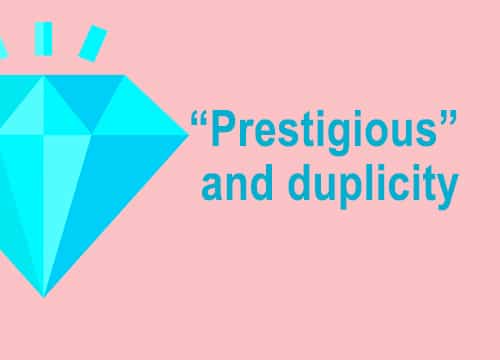“Prestigious” you may know or guess – in Spanish (prestigioso) the word is similar. So, you might say that Porsche and Rolls Royce are prestigious brands, having very good reputations. The noun is prestige (prestigio).
However, beware (¡cuidado!).
Some moons ago it was a word (in Spanish and English) that had a negative and pejorative (peyorativo) meaning. In English and Spanish up to the 1930´s it meant “deceitful” (engañoso) and “false”. There were also conjurors (prestidigitadores) who deceived the public.
So, the meaning of this word is duplicitious (tramposo), and its use is to be avoided.
Yes, now “prestigious” is used to refer to high reputation. The difficulty is that, when you read books written before 1950, it has the meaning that is negative. So when you read a Charles Dickens novel, or works by the 19th century philosopher John Stuart Mill, the meaning of “prestigious” is very different from today.
If you are preparing for the Cambridge Advanced or Proficiency exams, you have to be careful – when was the text written? Cambridge never says so, and therefore quessing from context is your only option.
Therefore a “prestigious politician” in the early 20th century or in the 18th century was one who was deceitful, and today he is a person who has a very good reputation.
Perhaps you have seen the brand Twinings, a company that has been making tea from 1706, or you know the brand “Burberrys” a quality clothes maker, set up in 1886. If you say that they are (or were) prestigious brands, what do you mean? Deceitful or false in the 19th century and of high reputation today?
Avoid the word at all costs (a toda costa).

















